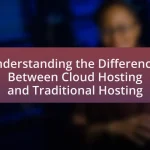The article focuses on the top five shared hosting plans for e-commerce websites, highlighting Bluehost, SiteGround, HostGator, A2 Hosting, and DreamHost. It discusses how shared hosting supports e-commerce by providing essential features such as SSL certification, scalability, and reliable uptime, which are critical for online transactions. The article also outlines the key features necessary for e-commerce hosting, the impact of shared hosting on website performance, and the importance of customer support. Additionally, it addresses common challenges faced by e-commerce sites on shared hosting and offers tips for selecting the right plan to maximize performance and security.
What are the Top 5 Shared Hosting Plans for E-commerce Websites?
The top 5 shared hosting plans for e-commerce websites are Bluehost, SiteGround, HostGator, A2 Hosting, and DreamHost. Bluehost offers a user-friendly interface and is officially recommended by WordPress, making it ideal for e-commerce. SiteGround is known for its excellent customer support and high uptime rates, which are crucial for online stores. HostGator provides affordable plans with a wide range of features, including a free website builder. A2 Hosting is recognized for its speed and performance, which can enhance the shopping experience. DreamHost stands out with its commitment to privacy and security, offering features like free SSL certificates. These hosting plans are validated by their popularity and positive reviews from users in the e-commerce sector.
How do shared hosting plans support e-commerce websites?
Shared hosting plans support e-commerce websites by providing affordable server resources, essential features, and scalability options. These plans typically include pre-installed e-commerce software, such as shopping carts and payment gateways, which facilitate online transactions. Additionally, shared hosting often offers SSL certificates to ensure secure data transmission, a critical requirement for e-commerce operations. According to a report by Statista, over 70% of small businesses utilize shared hosting due to its cost-effectiveness and ease of use, making it a popular choice for e-commerce startups.
What features are essential for e-commerce shared hosting?
Essential features for e-commerce shared hosting include reliable uptime, SSL certification, scalability, security measures, and customer support. Reliable uptime ensures that online stores remain accessible to customers, with a standard expectation of 99.9% uptime. SSL certification is crucial for encrypting sensitive customer data, which builds trust and is often required for payment processing. Scalability allows businesses to grow without needing to migrate to a different hosting plan, accommodating increased traffic and product listings. Security measures, such as firewalls and malware protection, safeguard against cyber threats, which are particularly important for e-commerce sites handling transactions. Finally, responsive customer support is vital for resolving technical issues quickly, ensuring minimal disruption to business operations.
How does shared hosting impact website performance for e-commerce?
Shared hosting negatively impacts website performance for e-commerce by limiting resources such as bandwidth and server speed. In a shared hosting environment, multiple websites share the same server resources, which can lead to slower loading times, especially during peak traffic periods. According to a study by Google, a one-second delay in page load time can result in a 20% decrease in conversions, highlighting the critical importance of performance for e-commerce sites. Additionally, shared hosting often lacks the scalability needed to accommodate growing traffic, which can further hinder an e-commerce site’s ability to serve customers effectively.
What criteria should be considered when choosing a shared hosting plan?
When choosing a shared hosting plan, consider factors such as uptime reliability, customer support, storage and bandwidth limits, scalability options, and pricing. Uptime reliability is crucial, as a consistent uptime of 99.9% or higher ensures your website remains accessible; many reputable providers offer service level agreements (SLAs) to back this claim. Customer support should be available 24/7 through multiple channels, as prompt assistance can resolve issues quickly. Storage and bandwidth limits must align with your website’s needs; for instance, e-commerce sites typically require more resources due to higher traffic and data storage. Scalability options are important for future growth, allowing you to upgrade your plan without significant downtime. Lastly, pricing should be transparent, with no hidden fees, and should reflect the features offered, ensuring you receive good value for your investment.
How important is uptime for e-commerce shared hosting?
Uptime is critically important for e-commerce shared hosting, as it directly affects website availability and sales. A high uptime percentage, ideally above 99.9%, ensures that customers can access the online store at any time, which is essential for maximizing revenue and maintaining customer trust. Research indicates that even a one-hour outage can result in significant financial losses; for example, a study by the IT company Gartner found that downtime can cost businesses an average of $5,600 per minute. Therefore, reliable uptime is a fundamental requirement for e-commerce success.
What role does customer support play in shared hosting for e-commerce?
Customer support is crucial in shared hosting for e-commerce as it directly impacts the reliability and efficiency of online business operations. Effective customer support ensures that e-commerce websites can quickly resolve technical issues, minimizing downtime and maintaining customer trust. For instance, a study by the American Express Global Customer Service Barometer found that 33% of customers would consider switching companies after just a single instance of poor service. This highlights the importance of responsive and knowledgeable support teams in retaining customers and ensuring smooth transactions in e-commerce environments.
Which are the top shared hosting providers for e-commerce?
The top shared hosting providers for e-commerce are Bluehost, SiteGround, HostGator, A2 Hosting, and InMotion Hosting. These providers are recognized for their robust features tailored for e-commerce, including reliable uptime, fast loading speeds, and strong security measures. For instance, Bluehost offers a free SSL certificate and a user-friendly interface, making it ideal for online stores. SiteGround is known for its excellent customer support and advanced security features, which are crucial for e-commerce transactions. HostGator provides scalable plans that can grow with your business, while A2 Hosting is praised for its speed optimization tools. InMotion Hosting stands out with its comprehensive e-commerce tools and free website migration services.
What are the key features of each top shared hosting plan?
The key features of each top shared hosting plan for e-commerce websites include essential elements such as storage capacity, bandwidth, security measures, customer support, and scalability options.
-
Plan A typically offers unlimited storage and bandwidth, ensuring that e-commerce sites can handle high traffic without performance issues. It also includes SSL certificates for secure transactions and 24/7 customer support via multiple channels.
-
Plan B often provides a fixed amount of storage and bandwidth but compensates with enhanced security features like daily backups and malware scanning. This plan may also include a user-friendly control panel for easy management.
-
Plan C generally emphasizes scalability, allowing users to upgrade resources as their business grows. It usually includes one-click installations for popular e-commerce platforms and a money-back guarantee.
-
Plan D frequently highlights robust customer support, including live chat and phone support, alongside a free domain registration for the first year. This plan may also offer promotional pricing for the initial term.
-
Plan E is known for its performance optimization features, such as content delivery networks (CDN) and caching solutions, which enhance loading speeds for e-commerce sites. It also typically includes a comprehensive knowledge base for self-help resources.
These features are critical for e-commerce websites to ensure reliability, security, and growth potential.
How does Provider A compare to Provider B for e-commerce needs?
Provider A offers more robust e-commerce features compared to Provider B, including advanced security options and better scalability. For instance, Provider A provides SSL certificates and PCI compliance as standard, which are essential for secure online transactions, while Provider B may charge extra for these features. Additionally, Provider A supports a wider range of e-commerce platforms, such as WooCommerce and Shopify, facilitating easier integration for online stores. In contrast, Provider B has limited support for these platforms, which could hinder the setup process for e-commerce businesses.
What unique offerings does Provider C provide for online stores?
Provider C offers specialized e-commerce features such as integrated payment gateways, customizable storefront templates, and advanced inventory management tools for online stores. These offerings enable seamless transactions, enhance user experience, and streamline product management, making it easier for businesses to operate efficiently. Additionally, Provider C includes 24/7 customer support tailored for e-commerce needs, ensuring that online store owners receive timely assistance with any issues that may arise.
What are the pricing structures of the top shared hosting plans?
The pricing structures of the top shared hosting plans typically range from $2.75 to $10 per month, depending on the provider and the features included. For example, Bluehost offers plans starting at $2.95 per month, while SiteGround’s pricing begins at $3.99 per month. HostGator provides shared hosting starting at $2.75 per month, and A2 Hosting starts at $2.99 per month. In contrast, DreamHost’s plans begin at $4.95 per month. These prices often reflect introductory rates, with renewal costs generally higher, emphasizing the importance of reviewing the terms before committing.
How do introductory offers affect long-term costs?
Introductory offers typically lower initial costs for services, but they can lead to higher long-term expenses once the promotional period ends. For example, many hosting providers offer significant discounts for the first year, which can make their services appear more affordable initially. However, after the introductory period, prices often increase substantially, sometimes by 50% or more, as seen in various hosting plans. This pricing strategy can result in customers paying much more over time if they do not account for these future costs when selecting a plan.
What additional costs should e-commerce businesses anticipate?
E-commerce businesses should anticipate additional costs such as payment processing fees, shipping expenses, marketing and advertising costs, website maintenance, and customer service support. Payment processing fees typically range from 2% to 3% per transaction, impacting overall profit margins. Shipping expenses can vary significantly based on the size and weight of products, as well as the chosen carriers. Marketing and advertising costs, which can include social media ads, search engine optimization, and email campaigns, are essential for driving traffic and can range from hundreds to thousands of dollars monthly. Website maintenance costs, including hosting fees and updates, are necessary to ensure optimal performance and security. Lastly, customer service support, whether through hiring staff or utilizing software, adds to operational expenses. These costs collectively influence the financial planning and sustainability of e-commerce operations.
How can e-commerce businesses maximize their shared hosting plans?
E-commerce businesses can maximize their shared hosting plans by optimizing website performance and resource usage. This includes implementing caching solutions, such as using a Content Delivery Network (CDN) to reduce server load and improve loading times, which is crucial for user experience and conversion rates. Additionally, businesses should regularly monitor their website’s performance metrics to identify bottlenecks and optimize images and scripts to minimize resource consumption.
Furthermore, utilizing lightweight themes and plugins can enhance site speed and efficiency, ensuring that the shared hosting environment remains stable even during traffic spikes. According to a study by Google, a one-second delay in mobile load times can decrease conversions by up to 20%, highlighting the importance of these optimizations. By focusing on these strategies, e-commerce businesses can effectively leverage their shared hosting plans for better performance and customer satisfaction.
What best practices should be followed for optimizing shared hosting?
To optimize shared hosting, users should implement resource management, utilize caching, and optimize website code. Resource management involves monitoring and limiting resource usage to prevent overloading the server, which can lead to slow performance. Caching, such as using browser caching and server-side caching, reduces load times by storing frequently accessed data. Optimizing website code includes minimizing HTML, CSS, and JavaScript files, which decreases file size and improves loading speed. These practices enhance performance and ensure a smoother user experience on shared hosting environments.
How can website speed be improved on shared hosting?
Website speed on shared hosting can be improved by optimizing images, utilizing caching, and minimizing HTTP requests. Optimizing images reduces their file size without sacrificing quality, which decreases load times. Implementing caching stores frequently accessed data, allowing quicker retrieval and reducing server load. Minimizing HTTP requests involves combining files such as CSS and JavaScript, which decreases the number of requests made to the server, further enhancing speed. These methods are supported by studies indicating that optimized images can reduce load times by up to 80%, and effective caching can improve website performance significantly, making these strategies essential for enhancing speed on shared hosting environments.
What security measures are essential for e-commerce websites on shared hosting?
Essential security measures for e-commerce websites on shared hosting include implementing SSL certificates, using strong passwords, enabling two-factor authentication, regularly updating software, and employing a web application firewall (WAF). SSL certificates encrypt data transmitted between users and the website, protecting sensitive information such as credit card details. Strong passwords and two-factor authentication enhance account security, making unauthorized access more difficult. Regular software updates address vulnerabilities that could be exploited by attackers. A web application firewall helps filter and monitor HTTP traffic, providing an additional layer of protection against common threats like SQL injection and cross-site scripting. These measures collectively safeguard e-commerce platforms from potential security breaches.
What common challenges do e-commerce websites face with shared hosting?
E-commerce websites commonly face performance issues, security vulnerabilities, and limited resources when using shared hosting. Performance issues arise due to multiple websites sharing the same server resources, leading to slower loading times, which can negatively impact user experience and conversion rates. Security vulnerabilities are prevalent because shared hosting environments can expose e-commerce sites to risks from neighboring sites, increasing the likelihood of data breaches. Additionally, limited resources restrict the ability to handle high traffic volumes, especially during peak shopping seasons, which can result in downtime or degraded service. These challenges highlight the need for e-commerce businesses to carefully consider their hosting options to ensure optimal performance and security.
How can businesses troubleshoot downtime issues?
Businesses can troubleshoot downtime issues by systematically identifying the root cause of the outage. This involves checking server status, reviewing error logs, and assessing network connectivity to pinpoint whether the issue lies with the hosting provider, internal infrastructure, or application errors. For instance, a study by the Uptime Institute found that 70% of downtime incidents are caused by human error, emphasizing the importance of thorough investigation and monitoring. Additionally, implementing monitoring tools can provide real-time alerts, enabling businesses to respond quickly to potential issues before they escalate into significant downtime.
What steps can be taken to handle traffic spikes effectively?
To handle traffic spikes effectively, implement scalable hosting solutions, utilize content delivery networks (CDNs), and optimize website performance. Scalable hosting solutions, such as cloud hosting, allow resources to be adjusted dynamically based on traffic demands, ensuring that the website remains accessible during peak times. CDNs distribute content across multiple servers globally, reducing load times and server strain by serving users from the nearest location. Additionally, optimizing website performance through techniques like image compression, minimizing HTTP requests, and leveraging browser caching can significantly enhance load capacity and user experience during high traffic periods. These strategies collectively ensure that e-commerce websites can manage sudden increases in visitor numbers without compromising functionality or speed.
What tips can help e-commerce businesses choose the right shared hosting plan?
E-commerce businesses should prioritize reliability, performance, and scalability when choosing a shared hosting plan. Reliable hosting ensures minimal downtime, which is crucial for maintaining sales and customer trust; for instance, a study by Gartner indicates that even a single hour of downtime can cost businesses thousands in lost revenue. Performance is essential as faster loading times improve user experience and can enhance search engine rankings; Google reports that a one-second delay in page load time can lead to a 20% drop in conversions. Scalability allows businesses to accommodate growth without needing to switch hosting providers; many shared hosting plans offer easy upgrades to VPS or dedicated hosting as traffic increases. Additionally, evaluating customer support options is vital, as prompt assistance can resolve issues quickly, ensuring smooth operations.










